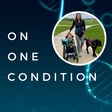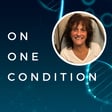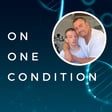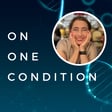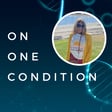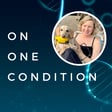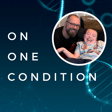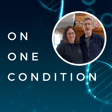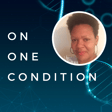Become a Creator today!Start creating today - Share your story with the world!
Start for free
00:00:00
00:00:01

Episode 33: Natalie Hayden - Crohn's Disease
Crohn's Disease is extremely unpredictable, and very hard to manage. Natalie was diagnosed with it just as her career was about to start. She didn't let it stop her; she decided to follow her dream of becoming a TV anchor no matter what. It wasn't that easy. She recounts episodes of great struggle and how difficult it is to manage the pain linked to Crohn's. Though the disease has shaped who she is, it does not define her.
The song Natalie chose is Swim by Jack's Mannequin.
Transcript
Introduction to 'On One Condition'
00:00:01
Speaker
Hi, I'm Sylvain Bertoreau, and you're listening to On One Condition, a podcast to raise awareness about health conditions by listening to people who leave them every day.
Guest Introduction: Natalie Hayden
00:00:11
Speaker
My guest today is Natalie Hayden, and we're going to talk about Crohn's disease. Hi, Natalie. Great to have you on the podcast. How are you doing? Doing wonderfully. Thanks so much for having me.
00:00:24
Speaker
Well, it's a pleasure to have you. I love doing every time we'll start with a song.
Inspirational Music and Health Struggles
00:00:31
Speaker
So what song did you choose and why? I chose Swim by Jax Mannequin because it's been an inspirational story for me for many, many years. My cousin has had two heart transplants and a kidney transplant. And that was his, if you say, theme song while he was in the hospital waiting for his double transplant. And because of my chronic illness, we've always
00:00:53
Speaker
aligned on understanding what it's like when you don't have your health. And that song has inspired me many times, many flare-ups and hospitalizations myself. So it's something that's followed you through hard times then? It sure has. Yes. Why this song then? Do you find it energizing or is it supportive?
00:01:14
Speaker
Yeah, the lyrics are so inspirational and they make me want to fight. And when I'm standing in the mirror and I have the IV pole and I see the bruises and all the pokes and prods, and I don't see my reflection looking back, it just reminds me of who I am, that this disease is not my identity, that I need to keep swimming when the going gets tough. Amazing. I have to listen to it. It really made me want to listen to the lyrics properly.
Understanding Crohn's Disease
00:01:42
Speaker
Yes.
00:01:44
Speaker
So we're talking about Crohn's disease today. Where should we start? Where do you want to start? That's a doozy of a question. It's a complicated, complicated disease. I've lived with it for almost 19 years. And I would say it's just the unpredictability of living with an illness where you can feel perfectly fine at breakfast and be hospitalized by dinner.
00:02:06
Speaker
So it's complicated in the aspect that everybody's inflammatory bowel disease presents uniquely. What one person deals with, another person might not. What food might trigger one person doesn't bother another person. What medication or biologic works for one person does not work for another. So it's very difficult to manage, treat, live with.
Impact of Food and Medication on Crohn's
00:02:30
Speaker
Our reality is definitely overlap, but it's very complex.
00:02:34
Speaker
Okay. You've mentioned so many things that I have so many questions about already. So you mentioned food. I understand that Crohn's is linked to the bowels. You mentioned inflammatory bowel disease.
00:02:52
Speaker
What, so for you in your experience, what triggered Crohn's and you mentioned having a day that sounds well, that could end up at the hospital. So why in that day would you have to go to the hospital? What makes Crohn's disease so complicated? I have an example that always resonates with me when I try to explain the unpredictability of it is I used to be a morning television news anchor and that morning
00:03:22
Speaker
It was a February morning, I anchored a morning show. I ran nine miles on the treadmill and I drove to see my now husband in St. Louis. And I was feeling on top of the world, wonderful. Well, by dinnertime that night, I was hospitalized with a bowel obstruction for the next five days and put on heavy duty steroids. And that is how it blindsides you.
00:03:43
Speaker
You go from feeling wonderful one moment to being in the bathroom or lying on the couch with a heating pad, and you are just expected to go through life like an average person, but you always have the looming fear of a flare.
00:03:56
Speaker
And luckily for me, I battled Crohn's for a decade before I needed surgery. But when I had my bowel resection surgery in August 2015, I had 18 inches of my small intestine and my appendix removed, that was the first thing to ever put me into remission. Now remission is not perfection, it's not a cure, but I often try to explain it as I have a lot more feel good days than I do painful ones.
Daily Life with Crohn's Disease
00:04:22
Speaker
And my disease is in a calm state right now, but at any given moment that remission can end, and I don't know when that moment's going to be. So since 2015, luckily I brought three healthy children into this world. I've stayed on my medication. I'm mindful of what I eat, but I do eat most things that I like. I don't have a lot of restrictions anymore. But I'm always thinking about how the decisions in my day are going to impact my disease. For instance,
00:04:48
Speaker
We're doing this podcast interview. I love to have a cup of coffee in the morning, but I did not want that to interfere with how well I'm feeling today. So I'm going to finish my cup of coffee after this call. Every little touch point in your day when you have inflammatory bowel disease,
00:05:03
Speaker
matters. And that can be so exhausting as a patient because this is an invisible illness. When you look at me and the millions of others across the world with Crohn's disease and ulcerative colitis, we look just like you, but we can be having pain off the charts and you would not even know it. Yeah, and I've heard that pain management is very difficult and can really affect your mood, can affect your mental health.
Diet and Inflammatory Bowel Disease (IBD)
00:05:28
Speaker
I think we'll come back to that in a sec.
00:05:32
Speaker
So is it directly linked to the diet or the food you ingest? When you ingest that food, could you tell us a bit more about that? Diet is a very hot topic, if you will, in the IBD community. It is a huge playmaker when it comes with disease, but still many providers, many doctors,
00:05:53
Speaker
They don't put much onus on diet, but patients are really adamant on talking more about their diet, reaching registered dieticians who specialize in IBD that can help you provide touch points along your journey to say, you know, maybe this is activating your disease. Maybe this is making you have more symptoms.
00:06:12
Speaker
There's not a clear cut answer with what works and what doesn't. Should you cut out gluten? Not sure. Should you limit your sugar? Not sure. There's lots of research going on, lots of topic of conversation about diet, but it's unique to each person and
00:06:27
Speaker
It's not something where you should just cut out all these different food groups. It's not necessary. And I think sometimes people go to the extreme because they're so desperate to feel better that they say, I don't want to be on medication. I want to be holistic. I want to do the best I can, especially pediatric caregivers for their little ones. They're worried about putting a five-year-old on a biologic injection, which I totally get.
00:06:48
Speaker
But sometimes people go to the extreme with all these different diets, and that's not sustainable. When you have IBD, there's no cure. So when you're given that diagnosis, you're right now going to have it until the day you die. I've been living with this since I was 21. I'm 40. So there's no cure in sight right now for me. So I think about diet, and when I'm flaring, I do eat differently. I watch how many fresh fruits and vegetables I eat.
00:07:12
Speaker
I don't drink alcohol. And if I do, I really watch what I drink because alcohol for me is a trigger. So I might just have one glass of wine. I haven't had beer since college because I don't like it first of all, but also because beer is known to cause your disease to spiral up.
00:07:30
Speaker
So, I try to refrain from drinking alcohol. If I'm flaring, I try to drink more smoothies rather than fresh fruits and vegetables. So, you think differently when you're in a flaring state. But for me now, with my disease, I'm actually able to eat popcorn, which I didn't do for almost 10 years, and I don't have any pain from it. So, I'm trying to enjoy this remission while I can because I know it's not forever.
00:07:56
Speaker
I've heard from other diseases that medication works. Some medications for some conditions will work for a certain amount of time, but then it will stop working and you have to find a different medication. What medication works for you, first of all, and do you know if it's going to work for life or not?
Experience with Humira for Crohn's
00:08:19
Speaker
I do not know how long it will last, but for me, I have been on Humira injections since 2008.
00:08:24
Speaker
And it has been a miracle drug for me. It's an injection in my thigh that I do every other week. At one point when I was having multiple bowel obstructions and we couldn't get my disease under control in 2015, I was doing weekly Humira injections and this was before the formula switched. So in the United States where I live, we received citrate free Humira.
00:08:45
Speaker
starting in September 2018 for the adult population. And that was a huge game changer because prior to that, and not everybody in the world has this formula yet, some people are still dealing with the painful version. It was an extremely painful injection. So it was a huge win for patients that can get the site trait free version because now you feel next to nothing. It is an extremely easy injection to give yourself whereas it used to be a lot of anxiety, a lot of pain, tears,
00:09:13
Speaker
just try and manage your disease. Now, with biologics, they can fail the patient. So for some people, they might do the loading dose, they might be on the drug for a couple months, and all of a sudden, that medication is not therapeutic. They're building up antibodies. They're not seeing that it's doing its job, and they have to switch biologics because of that. I am incredibly blessed and lucky that I've been able to say on one biologic since 2008.
00:09:37
Speaker
Now, I am being switched to a biosimilar due to insurance problems in a couple months, and I'm going to try to appeal that and see what comes of it. But a biosimilar is not a generic, but it is a similar medication to a biologic that companies are trying to do for cost saving measures. So we'll see what comes of that. I am confident that, luckily, from when I started on a biologic in 2008,
00:10:04
Speaker
There were only two biologics on the market for IBD patients, and now there are 10 plus options. So for me, I think, okay, if Humira fails me, then I'll try Stellara or Antibio or Remicade. You know, there's so many options now. There's still not enough for patients, honestly, because some people have had so many fail them, unfortunately.
00:10:26
Speaker
Well, it sounds like it's working for you, so that plus the diet that you still need to follow. Have you been able to be a bit more relaxed with your diet, with being on the medication?
00:10:39
Speaker
I wouldn't really credit the medication. I mean, it's hard to say when you've had surgery and it puts you into remission. I've been on this medication for so long, part of me sometimes wonders, is this necessary? Do I need it? But being a mom of three, my oldest will be turning seven in March. I tell myself, if I go off this medicine, it's risky and I don't have that
00:11:03
Speaker
you know, ability right now to play Russian roulette with my health. Because the last thing I want to do is go off on a therapy that's working for me and chance being hospitalized and not being able to get my IBD under control when I have three kids at home that need me.
00:11:17
Speaker
Yeah. Well, sounds intense, really. It is very intense. But it's something I think about all the time, because I think, you know, maybe when my kids are in college, if I'm still in remission, if I'm still doing well, maybe I'll give it a go. Maybe I'll try to do a little vacation from the biologic, if you will, and see what happens. But I'm just so grateful that my body hasn't built up antibodies just yet. I don't want to rock the boat. Yeah, yeah, I get that.
Pain of Crohn's Flares: A Comparison
00:11:42
Speaker
How bad is the pain when you have a flare?
00:11:46
Speaker
When I have a flare and I'm hospitalized, the pain is off the charts. I think if you talk to anybody that has chronic pain, we don't like that pain scale because one to 10, for us, 10 is dying. But we've also had this normalization of pain. We're desensitized to pain. Our normal for the day-to-day, even when we're feeling well, is more pain than a healthy individual. So it's difficult to put into words, but when I'm flaring, when I have a bowel obstruction, it has been so bad in the past.
00:12:12
Speaker
that I have blacked out, I vomit from the pain. I lose feeling oftentimes in my fingers and in my legs. And I've even almost passed out before. It gets so bad that when I was 26 years old, my dad had to carry me into the emergency room. I wasn't even able to walk. I usually can't stand upright when it is a severe acute problem. I have to stand hunched over and it's debilitating. It's hard to put into words.
00:12:41
Speaker
But I've lived with this disease for so long, I know what to watch out for. And sometimes I get fevers that indicate there's an infection going on. Or the pain, if it starts picking up, I'll tell my husband or my mom, I'm having a bad Crohn's Day. And I'll keep an eye on things. But luckily, with where I've been, I still have pain, but not to that level. Ball obstructions, many women say, are worse than childbirth, to give you an idea.
00:13:06
Speaker
Yeah. How can you get to the hospital if you're on your own suffering from such pain? Luckily, I've always had family members, coworkers. When I was a morning news anchor, I had a severe bowel obstruction in the newsroom and I was vomiting in to garbage cans next to my desk and my co-anchor had to rush me to the emergency room at two in the morning.
00:13:29
Speaker
And I was hospitalized that day. I've had my now husband, when we were dating, he would rush me to the hospital. My parents, whenever I'm home in Chicago, they would rush me to the hospital. There was only one time when I was at work in 2015 that I knew something was very serious. I almost passed out speaking at an event for my coworkers and I went in the bathroom and I told my boss, you know, I have to rush to the hospital.
00:13:56
Speaker
And it was about a 25 minute drive and I could barely hold the steering wheel. And I was on the highway and I just kept telling myself, you know, you have to get home. You have to get home.
00:14:05
Speaker
And then my husband met me there. He was my boyfriend at the time or my, um, fiance, I should say. And he took me to the hospital. So that was definitely dangerous, but there's some times where, you know, it happens when you least expect it and you are driving a car and you just got to focus on what you're doing as best you can and just get to where you need to be. But I've never had to call an ambulance. Luckily I've always had family or friends nearby.
00:14:30
Speaker
I'd like to focus on something a bit. You've been talking about feeling that you have a flare or saying that you have a bad Crohn's Day, but then you also talk about being at work and suddenly having to go to the hospital.
00:14:51
Speaker
And I know you've mentioned unpredictable multiple times, but it seems that it could go to the extreme very quickly. Is that right?
00:15:00
Speaker
It sure can. And every bowel obstruction I've had, I don't have fair warning. I'll be feeling fine. And then I find out through a CAT scan at the hospital, oh, you have a bowel obstruction going on. And I did not even know until maybe an hour or two before. So it's crazy how quickly it happens. When I was prior to being diagnosed, I had about two months where I didn't know what was going on. I had high fevers up to 104 degrees.
00:15:29
Speaker
Barely able to eat anything anytime I ate anything I had to run to the bathroom. I was a healthy athletic Spry 21 year old and I couldn't even take 13 stairs in my parents house down to get a drink I would have to text message people to bring me up, you know Gatorade or popsicles. That was all I could tolerate I was dropping weight I 5 5 and I got down to 115 at one point and
00:15:52
Speaker
Um, it's, it's debilitating in a lot of ways when you don't know what's going on, but that is an acute situation where I was malnourished. I was dehydrated.
00:16:02
Speaker
I was very, very sick when I was diagnosed. So I was diagnosed in the emergency room, which is often unheard of. They did a scan. They did a rectal exam and they said, you have Crohn's disease. You are getting admitted right now. You're getting a colonoscopy tomorrow to prove that that's what this is, but you have Crohn's disease. And that is the only moment in my life. I have a very good memory where I completely blacked out. I have no idea how I responded. I don't know if I...
00:16:27
Speaker
sat there in silence i don't know if i stopped i don't remember what i reacted like i just remember being in the hospital room afterwards so it's almost like my psyche has protected me from that trauma because when you are twenty one years old with your world ahead of you and you just graduated college,
00:16:45
Speaker
And you have aspirations and hopes and dreams of working in TV news. And your whole world comes crashing down as a young adult with your whole life ahead of you. It's very, very heavy and very, very isolating. Back then in 2005, Facebook hadn't even been out a year. I couldn't turn to social media. I had nobody online that I...
00:17:05
Speaker
I could reach out to to understand my reality. Whereas now in 2024, there are millions of people right at your fingertips. It is such a blessing to have Instagram and Facebook and Twitter or acts as we call it, or blogs where you can just tap into somebody. You can listen to a podcast and say, hey, that's my reality. She gets it. And you feel seen and heard. Back then, it was like, I don't know one person with this disease. Can you have kids with this? Can you get married? I mean, there were a million questions.
00:17:34
Speaker
Can I work and do a career? So it was very scary, but I also feel like that not that being naive and not knowing the severity of what was to come with my disease process. It kind of just showed me, you know, this isn't going to stop me from following my dreams. I packed up all my bags three months after diagnosis while I'm 22 pills a day and moved to Minnesota eight hours away from all family and friends and follow that TV dream.
00:17:58
Speaker
And I'm so proud of that young Natalie, because if I would have hindsight is 2020, I don't know if I would have had the strength to do that if I had
Chasing Dreams Despite Diagnosis
00:18:06
Speaker
to do it again. But I didn't let my disease rob me of my dreams. I worked 10 years in TV news. And when I left that news desk, I vowed.
00:18:14
Speaker
I will be the voice that young Natalie needed when she was in that hospital bed in a wheelchair going out to her parents' car. And I will do everything in my power to work diligently to help families at that newly diagnosed pivot where they have to say, I went from being healthy and now I have a chronic illness. What do I do next?
00:18:34
Speaker
Yeah, that's wonderful. I mean, you do a lot through your blog to really raise awareness, help people and help understand the situation with Crohn. So that's incredible what you've been doing. Thank you. How long was it before your diagnosis that you were in bed?
00:18:58
Speaker
So it's complicated because I try to think back to college. I was a senior year college student at Marquette University in Milwaukee, Wisconsin. And my friends and I loved having a good time. And we lived right by at Taco Bell. And I just felt like I was going to the bathroom more often. And I thought, are we eating too much Taco Bell or too much pizza? Just a typical college kid. And then we went to the Bahamas on spring break, my girlfriends and I.
00:19:20
Speaker
And when we arrived to the Bahamas, I had horrendous abdominal pain. I was in bed sweating. I felt horrible. And we didn't know if I got food poisoning or what was going on because we took a cruise ship out to the Bahamas. That was like a college party boat, basically.
00:19:36
Speaker
And that to me is really the turning point when that was probably an acute flare that I just didn't know it was happening. Fast forward two months and I graduated from college in May 2005 and then that's when the severe symptoms really started. Luckily for me,
00:19:51
Speaker
I was diagnosed on July 23rd, 2005. So I really only had a couple months where there was just major health issues going on. I didn't know what was the culprit. Many people have to go years before they get a diagnosis. So I was able to get an answer pretty promptly. I mean, it was scary for those couple of months because I remember just driving in my car and I'm 21 years old and I'm
00:20:14
Speaker
freezing to the point where I had to turn the heat on on a 95 degree day and then I would have to put the air conditioning on. And then my fevers were so abnormally high, it was very, very dangerous. My mom would have to put me in the bathtub and I couldn't even eat dinner. It was scary to go from being healthy and wondering, what is this and what do I have? And then my cousin's wife, so we're not blood relatives, but she was diagnosed with Crohn's the same week as me. And I was sick on the couch and my mom said,
00:20:43
Speaker
Natalie, she was on the phone with my aunt, you know, Elisa has Crohn's disease. And I looked up and I said, that's what I have too, because we had grown up with some kids that had Crohn's disease. So I had known a little bit about what it was more educated, probably than an average person at age 21. And I, you know, there I was with Crohn's disease a couple days later.
00:21:05
Speaker
And did you get any support from the hospital, from the healthcare system?
Initial Diagnosis and Misguided Advice
00:21:10
Speaker
Because you mentioned that at that time we didn't have social media as we do now. I got next to nothing when it came to support from the healthcare system. What was so daunting and overwhelming to me was that they sent in a dietician on my discharge day.
00:21:25
Speaker
And she was so doomsday and was clearly not fully educated on inflammatory bowel disease and told me for the rest of my life, I would never eat fruit. I would never eat vegetables. I was only allowed white bread. I was only allowed chicken. Everything had to be white. It could not be a wheat.
00:21:42
Speaker
I was only allowed two milligrams of fiber, which is incredibly incorrect. We actually need fiber in our diets with IBD. Everything was so different than what I typically ate because I was a very healthy eater. It's like insult to injury because you're on a steroid.
00:21:58
Speaker
I was put on 60 milligrams a day when I left the hospital after having IV steroids for about a week. And 60 milligrams is very, very heavy duty steroid. I got a moon phase, my hands would shake. I used to only be able to tolerate Cheerios when I left the hospital.
00:22:13
Speaker
And my spoon, I can still hear how it would clink against the bowl when I would try to eat my cereal, because my hand would be shaking so much from all of the drugs that I was on. My mom's a nurse, and I was at home after graduation, so I hadn't left my parents' house yet. And she would line up the 22 pills a day on a paper napkin on the counter, and she would help me stay regimented throughout the day. Because before you eat, you have to take an antacid, then you take your steroid once you've eaten. It's a whole process.
00:22:42
Speaker
And you know, 22 pills is a lot for one person. And then of course, there's side effects from those 22 pills as you're also flaring. So it was a lot. And luckily, I was able to go down to six pills a day, a few months after that, but I did six pills a day for three years. And then I went on the biologic and luckily didn't have to take any more pills after that.
00:23:04
Speaker
Going back to what you said about the dietician coming and explaining what you can't eat, and it sounds like the focus was very much on what you can't eat rather than what you can eat. Absolutely.
00:23:18
Speaker
And you're in pain and you're taking 22 pills a day. How did you feel? I felt like my world was over. Yeah, that's exactly what I was expecting because when you explained all of this, I felt like hopeless. How did you pick yourself up? I feel like I didn't realize in that moment what a hit my mental health took because I am a very positive
00:23:47
Speaker
happy person just by nature. But when I go back, because in my writing with my blog and different articles I've written, I've gone back to 2005 emails. Well, I would write friends of mine emails about my experience. And they are very dark. They're very bleak. I sound very depressed. And I probably could have used some therapy back then when I read them. It breaks my heart because that girl felt like
00:24:14
Speaker
you know, there was no hope. And I couldn't even tolerate any food as it was, but as somebody who used to love eating salads and strawberries and healthy food, I thought, how am I never gonna be able to eat any of this again? And I'm only 21 years old. And you know, there's the social aspect of it. I wanted to go out with my friends, have a good time. It just felt like I was almost an alien compared to my peers because everybody's healthy, everybody's living their best life. And here I am stuck in bed.
00:24:42
Speaker
on so much steroid that it would keep me up in the middle of the night till three or four in the morning and I would just blow big bubblegum bubbles so I wouldn't eat food because the steroid made me have a ravenous appetite and I was putting on weight and I was self-conscious with my appearance. My face was enormous. I had acne. I went from being somebody who wanted to work on television, on camera, to somebody who had to start out in TV news behind the scenes as a producer because of how much my looks changed.
00:25:10
Speaker
So it was kind of, you know, it really shot my ego quite a bit to go from wanting to be in the limelight to wanting to be in a dark studio where nobody could see me.
00:25:26
Speaker
And so you went to work. You'd just been diagnosed, if I understand correctly, and then you went to work. How was it keeping work together, not knowing when you were going to have a flare? How did it impact working life?
00:25:44
Speaker
It was very scary. I was so newly diagnosed, I wasn't well educated, and I have clear memories of having to unbutton my pants in the newsroom with guys and girls in there. Everybody's young. And I've had memories of hunching over, carrying these heavy scripts to the studio where I couldn't even walk upright. And my coworkers at all three of my television stations
00:26:07
Speaker
And when I worked in corporate America and in PR, everybody was so empathetic and everybody was supportive of me. I didn't have to hide anything. If I wasn't feeling well, the whole newsroom knew. If I was on air doing the morning show and I had to hold my stomach in between takes when my co-anchor was reading the news, everybody knew what was going on at all times. And they kept my story a secret for me. And I just am so grateful for having that support because I was away from my family. I lived hours away from them at these stations.
00:26:36
Speaker
And I really needed my support of my coworkers because they could see if I was flaring or if I was struggling or if I needed a hand with something or if I was hovered over at my desk and having a bad day. So it was complicated because I don't think I ever took a sick day. Honestly, I think I would just grin and bear it, which was crazy. But the only time I would miss work was when I would have a hospitalization. Otherwise, I was there even if I was at a pain level of a nine.
00:27:04
Speaker
just trying to get through and get the job done. Have you ever thought about writing a book about resilience?
00:27:12
Speaker
I have thought a lot about writing a book. That is a great question. It's on my plans of action for the next couple of years. I just haven't been able to narrow down what exactly I want to say and how I want to help people. But with my youngest being two and a half, you know, it's going to be a blink until he's in kindergarten. I'm a stay at home mom. So I've been home with my kids for nearly seven years. I will have the time to put my thoughts down on paper.
00:27:40
Speaker
And that will happen. I will write a book. I will make it happen. It's just a matter of one. Yeah. It sounds like such strength that you had to have really at that time to be able to carry on. And yeah, it sounds incredible. I'm glad that you're saying that you had the support around you from your colleagues.
00:28:04
Speaker
But still, I can't stop thinking about the impact on mental health. Did you have any long-term impact? Was there any time when you thought I'm just going to give up?
00:28:16
Speaker
I never have thought I'm going to give up. If anything, with the years that pass by, I feel more like a badass to be quite honest. I mean, to me, pardon my French, but I'm just being real here is as the years have gone by, I feel more and more empowered by my illness and I actually see it as a blessing rather than a curse because it has completely shaped who I am as an adult and it changed the entire path of my life.
00:28:41
Speaker
I was a good person before I was diagnosed, but I had just this feeling of invincibility and confidence that I did not know what could possibly happen to me. And I think that anybody who's healthy, they don't realize what a gift that is and how quickly it can be taken. And what happens to you when you were told you have a chronic illness of any sort for which there is no cure, it changes you as a person. And those first 10 years, I don't think I ever saw it as a positive, to be honest.
00:29:07
Speaker
But as I started advocacy and as I started connecting with people around the world with inflammatory bowel disease and other diseases, it has shown me what a unique and special group of people our communities are and all that we are capable of despite our disease. I think it's incredible that my body that is riddled with illness was able to bring three healthy kids into this world, that I was able to breastfeed my children, that I've been able to be a stay-at-home mom with little to no help and do everything on my own.
00:29:35
Speaker
It just makes me feel strong each and every day because I look at my kids and I think, you know, you're here and you're well and you're healthy despite mom's illness. Yeah, that's amazing. What made you want to write the blog?
Advocacy Through Blogging
00:29:50
Speaker
What was that moment where you thought I'm going to do this?
00:29:54
Speaker
was a big moment. So I wasn't an advocate yet and I was in the hospital on August 1st, 2015. I had just had my surgery and I lied in that hospital bed and I said a year from now because my diagnosis anniversary is July 23rd, I am going to launch a blog. I don't know what it's going to be called. I don't know what it's going to say, but this next year I'm going to work on this. So as a journalist,
00:30:18
Speaker
I thought about 50 blog names, then I narrowed it down to 25. Then I started socializing them with 50 plus family and friends and had people vote. Then it went down to 15, five. Then we finally came up with lights, camera, Crohn's and unobstructed view. And that is a play on words because of all of my ball obstructions. I wanted to put a play on words with that, but also show that my news writing and my sharing is going to be transparent and honest.
00:30:45
Speaker
And there is not going to be an obstructive view. You're going to hear the good, the bad, and the ugly. But I also wanted it to be positive. The few blogs that I was able to find in those first 10 years or the first patients that I would follow, they were very negative and were very doomsday to me. And it was not what I needed. So I kind of shut that off and I didn't really do a lot, you know, working with patient advocacy. So I wanted to be a different type of patient advocate. And now there's so many amazing advocates out there.
00:31:10
Speaker
But I wanted to say, yes, this is hard. Yes, we can do hard things. But I also wanted to show the light at the end of the tunnel and all that's possible. So my blog, I built an editorial calendar that next year where I vowed that every Monday I would share fresh content. And what is ironic is that my blog went live July 23, 2016. And two days later, I thought that I was pregnant with my son.
00:31:34
Speaker
My entire time blogging, I have been an IBD mom, if you will, and I had never connected with an IBD mom. So I was sharing, what's it like when you find out you're pregnant? What's it like when you're trying to find good doctors? And every little thing that comes with pregnancy and chronic illness, I was learning along the way and sharing that with my followers.
00:31:53
Speaker
And I shared fresh content for over six years. And I'm so proud of that because I did that through three pregnancies, delivering three babies. Even if I delivered my baby on a Thursday, there would be a fresh article on Monday. I never missed a Monday. And then finally, with three kids, I had to tell the community, OK, guys, I will still blog. Camera Crohn's will still be here. But I can't promise every week. And I still do about two to three articles a month, just not every week. And then I also do a lot of other advocacy work. I'm on a lot of different panels and boards.
00:32:23
Speaker
And I keep very, very busy. Even though I'm a stay-at-home mom, my advocacy is part of my daily life. Yeah, it really very much sounds like you've embraced Crohn's from the beginning and you keep embracing it and helping the community around you. How would you rate the community for Crohn's? How does it help you to be part of that community?
Supportive IBD Community
00:32:51
Speaker
The IBD community is something special. I know a lot of people in different disease spaces even say, wow, the Crohn's and UC community is something special. They are just, it's more of a family, honestly. And I oftentimes turn to my online friends that I've never been in person, but are so dear to me because they get my reality more than my actual friends that I see in person because a healthy person can't relate. They don't understand the complexity and oftentimes they dumb down what you're going through because they don't get it.
00:33:19
Speaker
Whereas I can turn to fellow IBD moms online.
00:33:23
Speaker
And they understand, they relate, they empathize. They're there for me in ways that other people are not. And it is so powerful to know that when I do have my next flare-up or hospitalization, that I will just post on Instagram and have thousands of people ready to be there for me. Yeah. Yeah. That's amazing. I love the impact community, like social media has to create communities. It's such a benefit. People always talk bad about social media, but I don't know what I would do if I didn't have that support and that community right at my fingertips.
00:33:54
Speaker
Yeah, I fully agree. And I was the same before. I thought social media wasn't necessarily
00:34:01
Speaker
Well, I wouldn't say it wasn't a good thing, but I wouldn't say it was a good thing either. Exactly. But no, now I see the positive impact it has on patients and Crohn seems to have a big community also talking with patients with rare disease where you can't find someone with the same disease as you right next to you.
00:34:25
Speaker
It really helps. And it helps with against this feeling of isolation that a lot of people feel when they've been diagnosed with a chronic illness. Exactly. I like your focus on the naming of the blog. It's interesting how sometimes you need to have the right name before you do anything. Yes. I felt like once I hit the name, it set the stage for what was to come. And now I would say most people just refer to it as lights, camera, crones. It's not the whole name.
00:34:55
Speaker
But the blog is well known, it's award winning, it's something I'm extremely proud of. It's an incredible resource for people because I don't just share my story, that would get boring. I like to share patient voices from around the world. I like to interview 25 plus people for certain articles where you get all of the viewpoints, all of the perspectives, you feel seen. If you're going through infertility, I can't speak about that, but I'm gonna interview women that are going through
00:35:21
Speaker
the same trenches as you. I want people to feel like they can be seen through these articles and helped when people direct message me and they say, I'm newly diagnosed. I need this. I need that. What do I do for colonoscopy? I know exactly what articles I've written. I've written over 500 total, not just on my blog, but elsewhere. And I can say, here's a link. Here's this. Look at this. This is a great resource. And what's so awesome is that there's gastroenterologists around the world who will tell their patients, look at lights, camera, Crohn's. This is a valid
00:35:49
Speaker
website. This is something that's credible that you can trust and this will help you. And that is the greatest honor of recognition I could get because when I know that people are sharing this with patients where when I was diagnosed, what I would have given to have a patient experience article that I do about Humira or what it's like to be pregnant. If I would have had that article, it would have been life changing for me. Yeah. Yeah. Yeah. I get that.
00:36:15
Speaker
What would you like to see in the future for Crohn's and IPD patients? I'd like to see a lot. I still think that there's a lack of education for newly diagnosed people because when they ask certain questions to me, I think, isn't this pretty basic? How are you not being told this by your provider? And that worries me.
00:36:36
Speaker
I think when it comes to starting a biologic, a lot of these big pharma companies can do a lot more to be there for patients and they've improved greatly, but there's still this lack of knowledge and this lack of understanding. I think there's just always room for improvement. There's room for better therapies, safer therapies. More research needs to be done to say, you know, what is safe for a pediatric patient? We can't be the guinea pigs, but unfortunately we have to be in a lot of ways because
00:37:03
Speaker
There's a lot more research that, you know, these therapies that are out there are not helping everybody. And when you have a rate of maybe, you know, 30% of people are benefiting from a drug. We need a drug that has a better rate of success. And I think there's so many patients out there who are struggling, who are not able to manage their disease. I think that remission often comes with luck. I don't think it's anything I did differently that I deserve this nine years of feeling well.
00:37:31
Speaker
People that are working their butts off, you know, following all these diets, staying on medication, they still can't reach remission. Everybody's disease is so complex and unique. When one person has a mild case of Crohn's, another person can have a severe case of Crohn's where they've had 30 plus surgeries, they have an ostomy, they're on medication, they cannot get under control. And those are the people that my heart really goes out to.
00:37:53
Speaker
because it's an uphill battle. I mean, if you can never reach remission, you're really not supposed to get pregnant when you're in a flaring state. So for women of childbearing age, they're diagnosed and they're not in remission. They're up against the clock of having a baby. They're maybe dealing with fertility issues because of scarring that has gone on from the surgeries they've had. They can't find a therapy that works and the ones that do work might not be safe in pregnancy. So think of all that stress on a person's shoulders
00:38:19
Speaker
When they're just trying to be a normal, healthy adult, have a family, do all the things that their peers are doing, they feel very alone in that. So I just think there needs to be more talk about mental health. There needs to be more talk about dieticians. There needs to be just a greater conversation. I think that all the advocates out there in the chronic illness space, we're trying to do that on a daily basis, but we're only one person. And we're doing our best to get our messages out there, but it's about reaching the people when they need that support, and that can be a challenge.
00:38:51
Speaker
Well, I hope for that future. What I find incredible is that I feel like I haven't heard just Natalie's voice, but I've heard the voice of all those many people that you talk to and who you're advocating for. So I love that. Thank you.
Positive Impact of Crohn's on Life and Identity
00:39:08
Speaker
Which leads me to my last question for today, which is one that I love asking. What's your happy place, a place where you feel at peace?
00:39:18
Speaker
My happy place is, you're gonna make me cry here, is just last night I look around the kitchen table and I see my kids and I see my husband and everybody's laughing and I'm feeling well and I'm able to eat dinner with them without pain or running to the bathroom. And I just thank God in that moment that I'm here, I have the family I hoped and dreamed of, I had the life I always wanted and that my crones never got in the way of that.
00:39:46
Speaker
That's amazing. I love that.
00:39:50
Speaker
Well, Natalie, it's been really amazing talking to you. You said two different things that I think summarize what I've heard today. You said that Crohn's does not define you. But at the same time, you said that it's shaped you and made you who you are.
00:40:16
Speaker
And I think that's such an amazing way at tackling such a chronic illness. And yeah, you've done so many amazing things despite Crohn's that I think you, and I'm sure you do, but you should be very proud of yourself and really, yeah. I appreciate that.
00:40:40
Speaker
Thank you. Yeah, I get emotional still and that's how I know that this disease does impact me because I've been in remission this many years and I still have that gratitude on a daily basis when I just go outside for a walk and it's sunny and I'm not in pain or my body or my joints aren't hurting me. It's the little things in life and that's what makes chronic illness a positive is that you have the ability to reflect in that moment and say thank you for this. Whereas when you're healthy, you take it for granted.
00:41:07
Speaker
Yep. I fully agree. Well, thank you so much for your time and all the best for the future. Same to you. Thank you.
